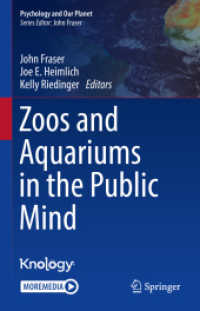- ホーム
- > 洋書
- > 英文書
- > Cinema / Film
Full Description
Entrenched in the myth of being victim of the Nazi aggression, Austrian elites pursued a politics of memory that symbolically shook off any responsibility for the emergence, development and consequences of National Socialism. Authors of the vast majority of films produced early after 1945 were not interested in dealing with the recent Nazi past of their country. There were, however, exceptions. Through detailed analysis of the narratives, stylistic patterns and reception of films that were set during or immediately after World War II, this book explains how cinema corroborated Austrian national self-stereotypes, at the same time offering a critique of the Nazi regime.
Contents
Contents
Acknowledgments
List of Figures
8 Introduction
9 National Socialism on the Margins of Film Narration
1 Introduction
2 National Socialism - Attention, Do Not Touch!
3 Verlorenes Rennen
4 Liebe Freundin
5 Der Engel mit der Posaune
6 Conclusion
10 The Exceptional Case of Der Prozess (1948)
1 Introduction
2 Encoded Message
3 Between Antisemitism and Philosemitism
4 The Reception
5 Conclusion
11 Heimkehrer Films (1946-1948)
1 Introduction
2 Arlberg-Express
3 An klingenden Ufern
4 Nach dem Sturm
5 Die Sonnhofbäuerin
6 Gottes Engel sind überall
7 Der weite Weg
8 Conclusion
12 The Anti-Nazi Resistance in Film (1948-1949)
1 Introduction
2 Das andere Leben
3 Die Frau am Weg
4 Duell mit dem Tod
5 Conclusion
13 War Dramas (1954-1955)
1 Introduction
2 Die letzte Brücke
3 Der letzte Akt
4 Conclusion
14 Conclusion
Appendix 1
Appendix 2
References
Index







